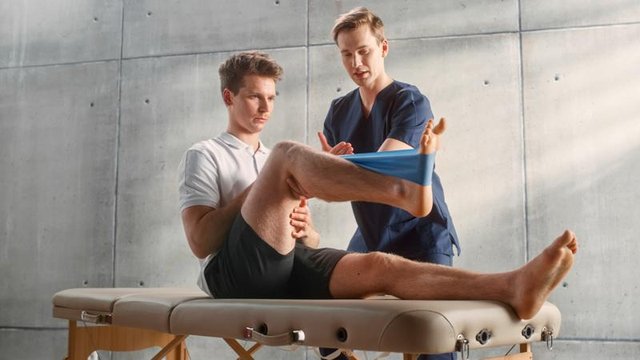
What do sports physiotherapists do?
Aug. 14, 2024

Sports physiotherapists, often called sports physios, play a crucial role in athletics and physical fitness. They are healthcare professionals who specialise in the prevention, diagnosis, treatment, and rehabilitation of sports-related injuries.
Their expertise not only aids athletes in recovering from injuries but also helps them enhance their performance and prevent future issues.
In this post, we’ll look at the role of a sports physiotherapist and what skills they need. And if you are considering a career in this important sector to help athletes reach their top performance, you should consider the Phsysiotherapy degree at Universidad Europea.
What is a sports physiotherapist?
A sports physiotherapist is a trained healthcare provider with specialised training in sports and exercise medicine. They possess an in-depth understanding of the musculoskeletal system, biomechanics, and the specific demands that different sports place on the body.
This expertise allows them to effectively manage injuries and provide targeted rehabilitation programs. Sports physios work with a diverse range of clients, from amateur enthusiasts to elite professional athletes, ensuring that each receives tailored care to meet their unique needs.
Where do sports physios work?
Sports physiotherapists can be found in various settings, reflecting the wide scope of their practice. Common workplaces include:
- Sports Teams and Clubs: Many sports physios work directly with professional sports teams, providing on-site care during training sessions, games, and competitions. They are a vital part of the team’s medical staff.
- Private Clinics: Some sports physios operate in private practice, where they treat a variety of patients, including athletes and non-athletes. These clinics often offer specialized equipment and facilities for rehabilitation.
- Hospitals: In hospital settings, sports physios may work within orthopedic or physical therapy departments, helping patients recover from surgeries or severe injuries.
- Rehabilitation Centres: Dedicated rehabilitation centres focus on helping patients regain functionality after significant injuries or surgeries, with sports physios playing a key role.
- Fitness Centres and Gyms: Some sports physios work in fitness centres, offering guidance on injury prevention and helping clients achieve their fitness goals safely.
What is their typical role and why are they important?
The role of a sports physiotherapist is multifaceted and critical to the health and performance of athletes. Key responsibilities include:
- Injury Prevention: Sports physios design and implement programs to help athletes avoid injuries. This includes educating athletes on proper techniques, warm-up routines, and exercises that enhance strength and flexibility.
- Injury Assessment and Diagnosis: When injuries occur, sports physios conduct thorough assessments to determine the nature and extent of the injury. They use their knowledge of anatomy and biomechanics to identify the problem accurately.
- Rehabilitation: Developing and overseeing rehabilitation programs is a core function. Sports physios guide athletes through tailored exercises and treatments to promote healing and restore function.
- Performance Enhancement: Beyond injury care, sports physios help athletes improve their overall performance. This includes optimizing movement patterns, improving strength and conditioning, and providing advice on nutrition and recovery strategies.
- Emergency Care: During sporting events, sports physios are often the first responders to injuries, providing immediate care and making critical decisions about further medical treatment.
Sports physiotherapists are essential because they help athletes recover quickly and safely, minimising downtime and ensuring a swift return to sport. Their expertise reduces the risk of re-injury and contributes to long-term athlete health.
What skills do you need to be a sports physio?
To excel as a sports physiotherapist, several key skills are necessary:
- Strong Knowledge Base: An in-depth understanding of human anatomy, physiology, and biomechanics is fundamental.
- Analytical Skills: The ability to assess injuries accurately and develop effective treatment plans is crucial.
- Communication Skills: Sports physios must communicate effectively with patients, coaches, and other healthcare professionals.
- Manual Therapy Skills: Proficiency in various manual therapy techniques is essential for treating musculoskeletal injuries.
- Empathy and Patience: Working with injured individuals requires a compassionate approach and the patience to guide them through sometimes lengthy recovery processes.
- Physical Stamina: The role can be physically demanding, requiring the ability to perform hands-on treatments and demonstrate exercises.
What to study to be a sports physio?
Becoming a sports physiotherapist involves a significant commitment to education and training. Here’s a typical pathway:
- Bachelor’s Degree: Start with a bachelor’s degree in physiotherapy like the one offered at Universidad Europea. This foundational education covers essential topics in anatomy, physiology, and basic therapeutic techniques.
- Master’s Degree: Many sports physios pursue a master in sports physiotherapy, such as the one at Escuela Universitaría Real Madrid – Universidad Europea or a related specialty, such as an Online Physiotherapy Course. This advanced training delves deeper into sports-specific rehabilitation, injury prevention, and performance enhancement.
In conclusion, sports physiotherapists are indispensable to the athletic world, ensuring athletes remain healthy, recover from injuries, and perform at their best. Their specialised knowledge, skills, and dedication make them invaluable assets in any sports-related setting.